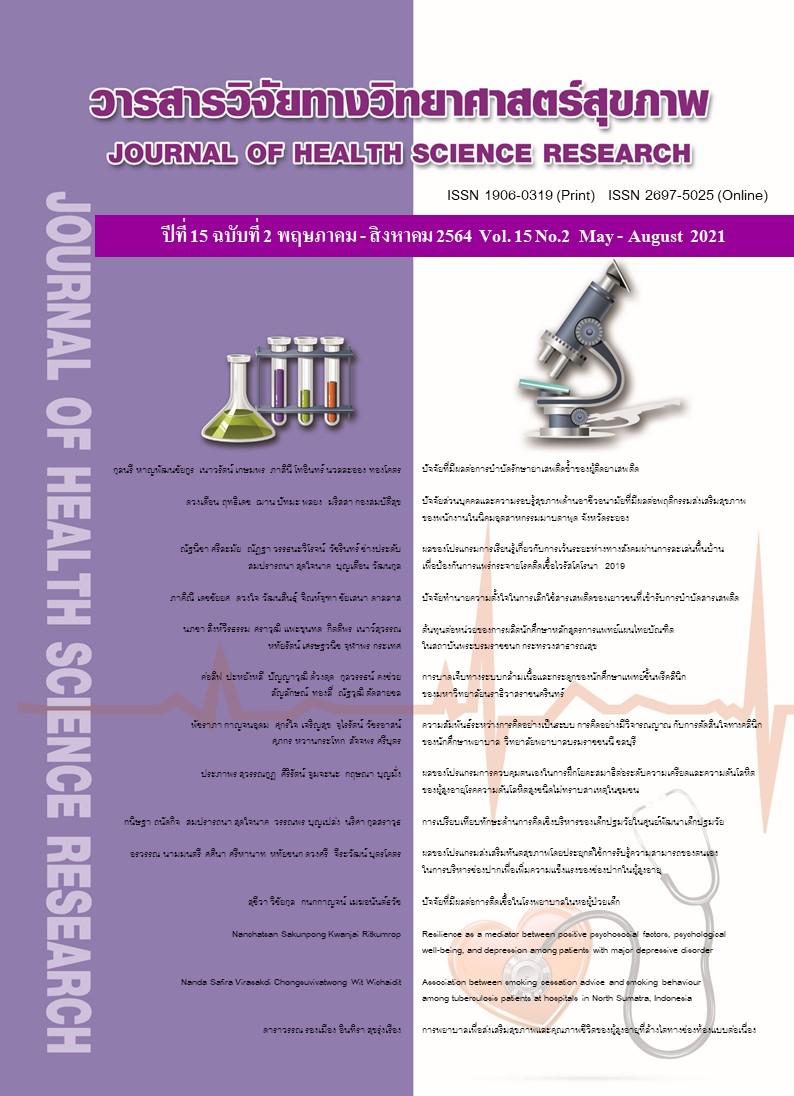ปัจจัยที่มีผลต่อการบำบัดรักษายาเสพติดซ้ำของผู้ติดยาเสพติด
Main Article Content
บทคัดย่อ
บทนำ : ปัญหาการเสพติดซ้ำเป็นปัญหาร้ายแรงที่มีผลกระทบต่อร่างกายจิตใจและก่อให้เกิดปัญหาสังคมที่รุนแรงตามมา
วัตถุประสงค์การวิจัย : 1) เพื่อศึกษาการรับรู้ปัจจัยเสี่ยงในการเสพยาเสพติดซ้ำ การรับรู้อุปสรรคของการบำบัดรักษาของผู้ป่วยยาเสพติด 2) เพื่อศึกษาปัจจัยที่มีผลต่อการบำบัดรักษายาเสพติดซ้ำของผู้ติดยาเสพติดที่เข้ารับฟื้นฟูสมรรถภาพ 3) เพื่อพัฒนาข้อเสนอแนะการป้องกันการเสพยาเสพติดที่ติดซ้ำ
วิธีการวิจัย : การวิจัยนี้เป็นการวิจัยแบบผสมผสาน ตัวอย่าง คือผู้ป่วยยาเสพติดที่เข้ารับการบำบัดรักษาอายุ 18 ปีขึ้นไป ไม่ได้รับการวินิจฉัยว่ามีอาการทางจิต และสามารถอ่านออกเขียนได้ จำนวน 123 คน วิเคราะห์ข้อมูล โดยใช้สถิติไคว์สแควร์และ การวิเคราะห์การถดถอยโลจิสติคทวิ
ผลการวิจัย : ปัจจัยที่มีผลต่อการบำบัดรักษายาเสพติดซ้ำอย่างมีนัยสำคัญทางสถิติ ที่ระดับ .05 คือ การไม่มีงานทำ ร่างกายต้องการยาเสพติด แนวทางในการป้องกันการเสพติดซ้ำของผู้ติดยาเสพติดที่เข้ารับฟื้นฟูสมรรถภาพ คือ การให้การช่วยเหลือกลุ่มผู้ติดยาเสพติดซ้ำที่แตกต่างกัน 3 กลุ่ม ได้แก่
กลุ่มเปราะบาง กลุ่มที่เสี่ยงต่อการเสพติดยาเสพติดซ้ำ และกลุ่มที่เสพยาเสพติดซ้ำหลายครั้ง แนวทางการป้องกันการเสพซ้ำ ข้อเสนอแนะการบำบัดรักษาเพื่อป้องกันการเสพซ้ำควรครอบคลุมการมีส่วนร่วมของชุมชน ระบบส่งต่อที่เข้มแข็ง และการติดตามผลอย่างเข้มข้น
สรุปผล : ความรู้จากงานวิจัยสามารถนำไปพัฒนาแนวทางทางการป้องกันการเสพซ้ำได้
Downloads
Article Details
บทความที่ได้รับการตีพิมพ์เป็นลิขสิทธิ์ของวิทยาลัยพยาบาลบรมราชชนนี จังหวัดนนทบุรี
ข้อความที่ปรากฏในบทความแต่ละเรื่องในวารสารวิชาการเล่มนี้เป็นความคิดเห็นส่วนตัวของผู้เขียนแต่ละท่านไม่เกี่ยวข้องกับวิทยาลัยพยาบาลบรมราชชนนี จังหวัดนนทบุรี และคณาจารย์ท่านอื่น ในวิทยาลัยฯ แต่อย่างใด ความรับผิดชอบองค์ประกอบทั้งหมดของบทความแต่ละเรื่องเป็นของผู้เขียนแต่ละท่าน หากมีความผิดพลาดใด ๆ ผู้เขียนแต่ละท่านจะรับผิดชอบบทความของตนเองแต่ผู้เดียว
เอกสารอ้างอิง
Office of Narcotics Control Board: Ministry of justice. Thailand narcotic control annual report: Ministry of Justice; 2018. (in Thai).
Ministry of Justice. Narcotic Addict Rehabilitation Act, B.E. 2545. [internet]. 2002 [cited 2021 May 6]; Available from: http://thailaws.com/law/tlaws/tlaw0149_2.
Department of Probation. Annual report Department of Probation. Ministry of Justice. 2019; (in Thai).
Hiranyatheb T, Udomsubpayakul U, Kongsakon R. Factors associated with non-relapsed in clients who completed the rehabilitation program in compulsory treatment system for drug addiction. The Journal of The Psychiatric Association of Thailand. 2013;58(2):157-64. (in Thai).
Suppadit T, Poungsuk P, Srisukond, P. Factors influencing return to narcotic taking of drug users who were released from the narcotic remedy program: A case study of an adolescent group in Phetchaburi Province Area, Thailand. NIDA Development Journal. 2007;47(2):29-56. (in Thai).
Chatuhong S, Tansrisakul S. Factors affecting relapse drug users with competency rehabilitation in treatment compulsory system as a case study of office of probation, Roi-ed Province. Chophayom Jorurnal. 2018;29(1):199-210. (in Thai).
National Institute on Drug Abuse (NIDA). Drugs, brains, and behavior: The science of Addiction. [internet]. 2021 [cited 2021 May 6]; Available from: https://www.drugabuse. gov/publications/drugs-brains-behavior-science-addiction/ preface.
AshaRani PV, Hombali A, Seow E, Ong WJ, Tan JH, Subramaniam M. Non-pharmacological interventions for methamphetamine use disorder: a systematic review. Drug Alcohol Depend. 2020;1 (212):108060. doi: 10.1016/j.drugalcdep.20 20.108060.
Reginal of Office of the Narcotics Control Board 6. Lesson learnt: the home visiting process in addicted person and family. Substance studies center, North region, Chiangmai University. (in Thai).
Supawong A. The effectiveness of modified matrix program drug treatment of Thungsong Hospital. Songklanagarind Journal of Nursing. 2016;36(Supplement): 160-70. (in Thai).
Sriyakun D. Care for drug addiction in adolescent, case study. Region 11 Medical Journal. 2018;32(1):841-52. (in Thai).
Piawpongpakawat A. Factors predicting family and community social supports on quitting of methamphetamine in Nongki Hospital. Regional Health Promotion Center 9 Journal: The Journal for Health Promotion and Environmental Health. 2019;14(33):22-34. (in Thai).
Athan P, Somprasert C, Bunthumporn N. The effects of a psychosocial rehabilitation program on the quality of life of addicted patients. The Journal of Psychiatric Nursing and Mental Health. 2019;33(2): 61-75. (in Thai).
Wongpanarak N, Boonruang P. Relationships among hope, self-esteem, and the perceptions of spiritual dimension of people with drugs dependence in northeastern region of Thailand. Journal of The Royal Thai Army Nurse. 2017;18(2):47-54. (in Thai).
Vathisunthorn P, Chedchom k. The success of treatment among drug dependent patient compares between compulsory and voluntary systems. Department of health service support, Ministry of public health; 2552. (in Thai).
Hanpatchaiyakul K, Eriksson H, Kijsomporn J, Östlund G. Barriers to successful treatment of alcohol addiction as perceived by healthcare professionals in Thailand - a Delphi study about obstacles and improvement suggestions. Glob Health Action. 2016; 9:31738. doi: 10.3402/gha.v9.31738.
Rapp RC, Xu J, Carr CA, Lane DT, Wang J, Carlson R. Treatment barriers identified by substance abusers assessed at a centralized intake unit. J Subst Abuse Treat. 2006;30(3):227-35. doi: 10.1016/j.jsat.2006.01.002.


